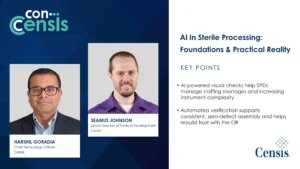Scaling Throughput with AI-driven Insurance Claim Processing
The successful use of AI for insurance claim processing depends on identifying and optimizing the performance of hardware and software tools that increase its efficiency, flexibility, and speed. Vasant Kearney, Ph.D., CTO of Retrace Labs, and Ravi Panchumarthy, Ph.D., Machine Learning Engineer at Intel Corporation spoke about the specific challenges faced by the dental industry when it uses cloud-based AI computing to process claims, and the creative innovations that Intel and Retrace have developed to address those challenges.
“The thing that makes AI-driven insurance claim processing challenging is the throughput,” Kearney says. “If you’re in a single hospital or small clinic, scalability isn’t much of an issue. But once you move into the insurance world – where the volume is much higher – you have to manage spikes in throughput.” The ability of the AI algorithms being used to manage these spikes (scaling performance up or down based on demand) is determined by how much compute has been allocated to solving the problem. This is where the choice of hardware and software becomes critical.
Most data scientists are familiar with GPUs and choose them when deploying models in production. But GPUs can be costly and create delays due to the way they handle memory and how they are deployed onto scalable tools. “It’s not trivial to share memory between GPUs,” says Kearney. “So, you’re limited by the rather low-memory footprint of each GPU. In AWS, you have GPUs in the range of 12 gigabytes. But CPUs can get up into the terabytes.” This means that many more models can be stored on each instance, making CPUs ideal for healthcare where many different models are often needed to make diagnoses.
Both Panchumarthy and Kearney are excited about the future of AI-driven cloud computing for the insurance industry. “There is great synergy between cloud computing and cutting-edge hardware and software solutions from Retrace and Intel,” says Panchumarthy. “All of these are helping drive even more intelligent and robust medical AI solutions. It’s an exciting place to be.”
Learn more about AI deployment solutions by connecting with Vasant Kearney and Ravi Panchumarthy on LinkedIn or visit Intel’s AI and Deep Learning Solutions to learn more about AI-driven Solutions: https://www.intel.com/content/www/us/en/artificial-intelligence/overview.html
To get started with OpenVINO: https://docs.openvinotoolkit.org/latest/index.html
Learn more about Retrace: https://retrace.ai/media-and-news/
Subscribe to the “Health and Life Sciences at the Edge” channel on Apple Podcasts, Spotify, Google Podcasts, or Simplecast to hear more from the Intel Internet of Things Group.









